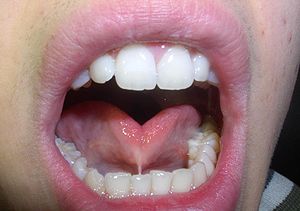Ankyloglossia
| Ankyloglossia | |
|---|---|
 |
|
| Adult with ankyloglossia | |
| Classification and external resources | |
| Specialty | medical genetics |
| ICD-10 | Q38.1 |
| ICD-9-CM | 750.0 |
| OMIM | 106280 |
| DiseasesDB | 33478 |
| MedlinePlus | 001640 |
| MeSH | C562396 |
Ankyloglossia, also known as tongue-tie, is a congenital oral anomaly that may decrease mobility of the tongue tip and is caused by an unusually short, thick lingual frenulum, a membrane connecting the underside of the tongue to the floor of the mouth. Ankyloglossia varies in degree of severity from mild cases characterized by mucous membrane bands to complete ankyloglossia whereby the tongue is tethered to the floor of the mouth.
Ankyloglossia can affect eating, speech, and oral hygiene as well as have mechanical/social effects. Ankyloglossia can also prevent the tongue from contacting the anterior palate. This can then promote an infantile swallow and hamper the progression to an adult-like swallow which can result in an open bite deformity. It can also result in mandibular prognathism; this happens when the tongue contacts the anterior portion of the mandible with exaggerated anterior thrusts.
According to Horton et al.,diagnosis of ankyloglossia may be difficult; it is not always apparent by looking at the underside of the tongue, but is often dependent on the range of movement permitted by the genioglossus muscles. For infants, passively elevating the tongue tip with a tongue depressor may reveal the problem. For older children, making the tongue move to its maximum range will demonstrate the tongue tip restriction. In addition, palpation of genioglossus on the underside of the tongue will aid in confirming the diagnosis.
A severity scale for ankyloglossia, which grades the appearance and function of the tongue, is recommended for use in the Academy of Breastfeeding medicine.
Opinion varies regarding how frequently ankyloglossia truly causes problems. Some professionals believe it is rarely symptomatic, whereas others believe it is associated with a variety of problems. The disagreement among professionals was documented in a study by Messner and Lalakea (2000). The authors sent a survey to a total of 1598 otolaryngologists, pediatricians, speech-language pathologists and lactation consultants with questions to ascertain their beliefs on ankyloglossia. 797 of the surveys were fully completed and used in the study. It was found that 69% of lactation consultants, but only a minority of pediatricians answered that ankyloglossia is frequently associated with feeding difficulties; 60% of otolaryngologists and 50% of speech pathologists answered that ankyloglossia is sometimes associated with speech difficulties compared to only 23% of pediatricians; 67% of otolaryngologists compared with 21% of pediatricians answered that ankyloglossia is sometimes associated with social and mechanical difficulties. Limitations of this study include a reduced sample size due to unreturned or incomplete surveys.
...
Wikipedia
